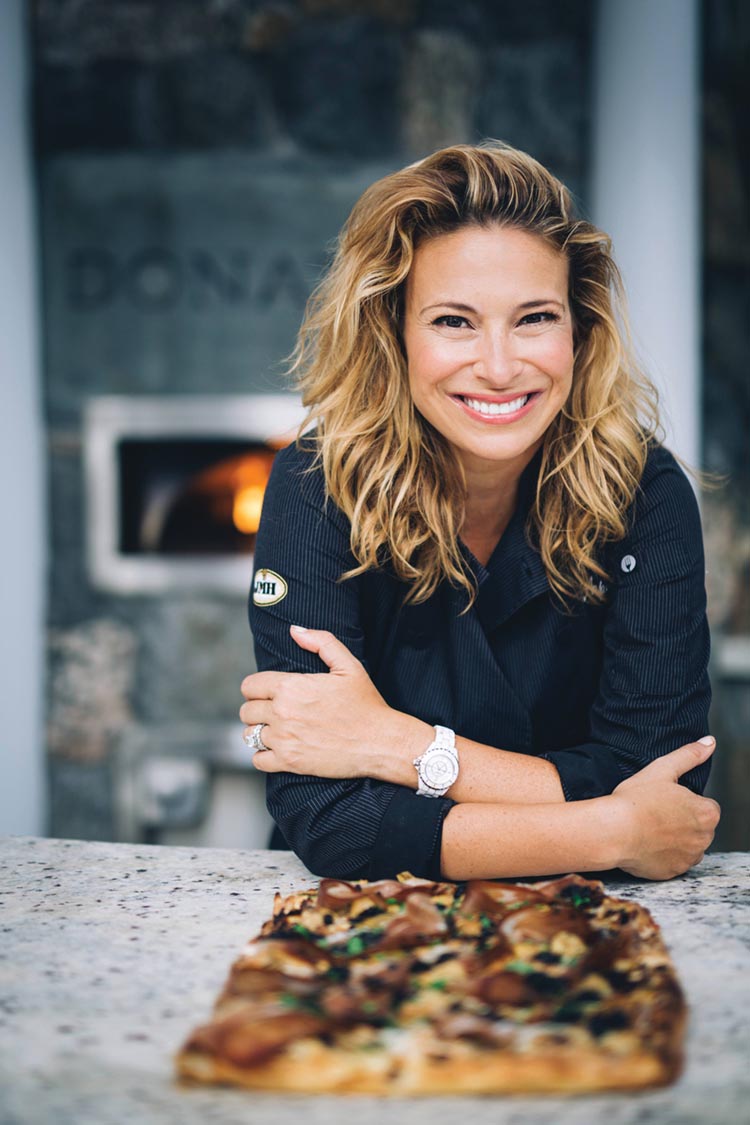
With the first Prova Pizzabar satisfying commuters and visitors alike in New York’s Grand Central Terminal, Chef Donatella Arpaia plans to open more nationwide—the latest venture in her remarkable career
By Sara Perez Webber
Donatella Arpaia beat out more than 300 competitors for her fast-casual restaurant’s spot at Grand Central Terminal in New York. Prova Pizzabar, on the terminal’s lower level, was an instant hit when it opened in fall 2016, offering 10 varieties of Neopolitan-inspired pizzas, by the slice or pie, as well as garlic knots, Caprese salad and Donatella’s Famous Meatballs. Thirsty commuters can even purchase their wine to go in one of Prova’s “adult sippy cups.”
“People are wanting and craving a better product in fast-casual environments,” says Arpaia. “People want a better pizza, with no preservatives and toppings that are fresh. So that’s why people are coming back—and it’s delicious.”
Arpaia has proven time and again she knows the recipe for a successful restaurant. She opened her first, Bellini in New York, in 1998, after a brief stint as a lawyer. Following were a string of successful and acclaimed New York restaurants, including Mia Dona, Anthos, Kefi and Donatella. Zagat has crowned her “The Hostess with the Mostest,” while the New York Post once named her one of the most powerful women in Manhattan. She also frequently serves as a judge on Food Network’s Iron Chef America and The Next Iron Chef.
As Arpaia tackles her next challenge—taking the Prova Pizzabar chain nationwide—she spoke with Catering Magazine about her unorthodox path to success, her fast-casual concept and her entertaining philosophy.
CM: Why did you decide to give up your law career and open a restaurant?
Arpaia: I was born into a food family. My father was a restaurateur, and both my parents are first-generation Italian. I was always surrounded by food, in an Italian culture with people obsessed with food. My father wanted me to become a lawyer. My brother was groomed for the business. I was eating dinner at [my brother’s] restaurant one night, and I got up to help him, and I had my “aha” moment. I felt so alive; it was so natural to me. I quit [the law] and never looked back, not even for a second. But the law has been very helpful to me; it teaches you how to think in a certain way, and with licensing deals and contracts, it’s been extremely beneficial to me.
CM: What led you to attend culinary school after you had become a successful restaurateur?
Arpaia: I do everything in reverse—I’m crazy. I had my third restaurant, and had been doing a lot of TV. And yet I felt, even though I knew about food, I was beholden to a chef, and I wanted to master my trade and learn everything about every part of the business. I wanted to become more informed, and have a lot more say in menu development. I believe if you have a foundation you can really break the rules.
I was at the height of my success, and I remember these young students saying, “Didn’t I see you on Iron Chef last night? What are you doing here?”
CM: What’s your culinary philosophy?
Arpaia: Seasonality, ingredients first, finding the freshest, best food, and not messing with it too much. Italian cooking is my love. I love homemade pasta, and everything southern Italy in particular has to offer, but Italian in a modern way, reflecting our lifestyle.
CM: How did you come up with the concept for Prova Pizzabar?
Arpaia: My father is from Naples, and I studied Neapolitan pizza-making in Naples. When I decided to go away from high-end dining and move into a fast-casual concept, I wanted to create an incredibly healthy pizza that tastes unbelievably delicious. Neopolitan pizza doesn’t transport well, so it’s a hybrid between Neapolitan and Roman. The hydration of the pizza is 80 percent—it’s a very wet dough, and we let it rise for over two days, so the fermentation occurs outside the body. The flour is made from ancient grains.
The goal is to expand. We wanted our first place to be in a very iconic location. Grand Central is [one of the top] tourism destinations in New York. It’s been a labor of love. It’s doing incredibly well, and we just signed for our second location in New York, in a very busy location in Midtown. Our plan to grow across the country.

CM: What’s your favorite item on the menu?
Arpaia: Pizza-wise, it depends on my mood. I’m famous for my meatballs, which people go crazy for, and the Regina, which is like a Margherita on steroids [with tomato sauce, buffalo mozzarella, cherry tomatoes and basil].
CM: How much catering business does Prova Pizzabar do?
Arpaia: We are doing catering, but it’s not huge yet because space is such an issue in Grand Central. Once we get our second location we will be able to do more. Catering is huge; it’s such an important part of any business model, especially profit-wise. It’s just like a no-brainer for any restaurant, especially when you get corporate clients.
CM: What do you enjoy most about being a judge on Food Network’s Iron Chef America and Next Iron Chef?
Arpaia: It keeps you up-to-date with food trends, and you’re getting exposed to some of the best chefs, so I’m constantly getting inspired by what they cook. It’s the most real of reality TV; it’s not about the drama, it’s about the food.
CM: You’ve designed a home-entertaining line for Frontgate, and Zagat once named you “the Hostess with the Mostest.” What do you think are the elements that make up a successful party or event, and how do you make sure that your restaurants reflect your entertaining philosophy?
Arpaia: I always had the ability to make people feel really comfortable. People want to feel recognized and special, and you want that connection. I always advise people to try to be as organized as possible, so that when your guests come you can actually be a host. Invite people into your kitchen—people love being in the kitchen—and get them a glass of wine. Even if things are going wrong, don’t let your guests know; they’re just happy they were invited. Your mental state as the host is really important; it feeds off the whole event. Even if everything goes wrong, as long as you’re in a calm place, and you give that off to your guests, it will be a successful night.
CM: Do you apply this philosophy when hiring and training employees?
Arpaia: I try to find people who have that as a natural ability, especially in a host position. When you get someone who has a natural hospitality, then you add the skill, that’s when you get the perfect [employee]. If it’s bad service, the worst thing to do is ignore it. Mistakes will happen no matter what; it’s how you handle them that determines if you have a customer for life or never see them again. We constantly have to reinforce that sense of hospitality; to me, it’s everything. I can have the best pizza in the world, but if I have someone mean serving it, there are a lot of other choices.









